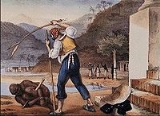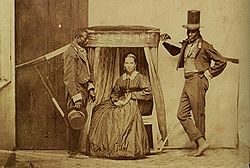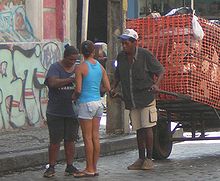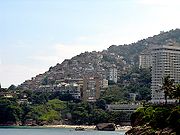
Social apartheid in Brazil
Encyclopedia

Social apartheid
Social apartheid refers to de facto segregation on the basis of class or economic status, in which an underclass is forced to exist separated from the rest of the population...
has been used to describe various aspects of economic inequality
Economic inequality
Economic inequality comprises all disparities in the distribution of economic assets and income. The term typically refers to inequality among individuals and groups within a society, but can also refer to inequality among countries. The issue of economic inequality is related to the ideas of...
in Brazil
Brazil
Brazil , officially the Federative Republic of Brazil , is the largest country in South America. It is the world's fifth largest country, both by geographical area and by population with over 192 million people...
, drawing a parallel with the separation of whites and blacks in South Africa
South Africa
The Republic of South Africa is a country in southern Africa. Located at the southern tip of Africa, it is divided into nine provinces, with of coastline on the Atlantic and Indian oceans...
n society under the apartheid regime.
Origins

Great Depression
The Great Depression was a severe worldwide economic depression in the decade preceding World War II. The timing of the Great Depression varied across nations, but in most countries it started in about 1929 and lasted until the late 1930s or early 1940s...
, when internal migrants, who were mainly descended from Amerindians or African slaves, were given no government assistance or training in adapting to large urban centers, and thus were pushed into a "social apartheid", forced to live in slums and take unpleasant and menial jobs that whites shunned. By contrast, European, Arab and Japanese
Japanese people
The are an ethnic group originating in the Japanese archipelago and are the predominant ethnic group of Japan. Worldwide, approximately 130 million people are of Japanese descent; of these, approximately 127 million are residents of Japan. People of Japanese ancestry who live in other countries...
immigrants were directly assisted by a number of government programs, as well as other benefits.
Racial and class basis

Afro-Brazilian
In Brazil, the term "preto" is one of the five categories used by the Brazilian Census, along with "branco" , "pardo" , "amarelo" and "indígena"...
s. According to São Paulo
São Paulo (state)
São Paulo is a state in Brazil. It is the major industrial and economic powerhouse of the Brazilian economy. Named after Saint Paul, São Paulo has the largest population, industrial complex, and economic production in the country. It is the richest state in Brazil...
Congressman Aloizio Mercadante
Aloízio Mercadante
Aloízio Mercadante Oliva is an economist and Brazilian politician. He was one of the founders of the Workers' Party in February, 1980, and served as vice-president of the party from 1991 to 1999.-See also:...
, a long-standing member of Brazil's leftist Workers' Party
Workers' Party (Brazil)
The Workers' Party is a democratic socialist political party in Brazil. Launched in 1980, it is recognized as one of the largest and most important left-wing movements of Latin America. It governs at the federal level in a coalition government with several other parties since January 1, 2003...
(PT), "Just as South Africa had racial apartheid, Brazil has social apartheid." Journalist Kevin G. Hall wrote in 2002 that Afro-Brazilian
Afro-Brazilian
In Brazil, the term "preto" is one of the five categories used by the Brazilian Census, along with "branco" , "pardo" , "amarelo" and "indígena"...
s trail White Brazilian
White Brazilian
White Brazilians make up 48.4% of Brazil's population, or around 92 million people, according to the IBGE's 2008 PNAD . Whites are present in the entire territory of Brazil, although the main concentrations are found in the South and Southeastern parts of the country...
s in almost all social indicators, including income
Income
Income is the consumption and savings opportunity gained by an entity within a specified time frame, which is generally expressed in monetary terms. However, for households and individuals, "income is the sum of all the wages, salaries, profits, interests payments, rents and other forms of earnings...
and education
Education
Education in its broadest, general sense is the means through which the aims and habits of a group of people lives on from one generation to the next. Generally, it occurs through any experience that has a formative effect on the way one thinks, feels, or acts...
, and those living in cities are far more likely to be abused or killed by police
Police
The police is a personification of the state designated to put in practice the enforced law, protect property and reduce civil disorder in civilian matters. Their powers include the legitimized use of force...
, or incarcerated.
Brazil's social situation also has negative impacts on educational opportunities for the disadvantaged. The wealthy live in walled-off gated communities
Gated community
In its modern form, a gated community is a form of residential community or housing estate containing strictly-controlled entrances for pedestrians, bicycles, and automobiles, and often characterized by a closed perimeter of walls and fences. Gated communities usually consist of small residential...
, and the disadvantaged classes do not interact at all with the wealthy "except in domestic service and on the shop floor".
According to France Winddance Twine
France Winddance Twine
France Winddance Twine is Professor of Sociology and filmmaker at the University of California, Santa Barbara. She is the former Deputy Editor of American Sociological Review, the flagship journal of the American Sociological Association...
, the separation of both class and race even extend into what she terms "spatial apartheid", where upper-class residents and guests, presumed to be white, enter apartments buildings and hotels through the main entrance, while domestics and service providers, presumed to be black, enter at the side or rear.
Civil rights activist Carlos Verrisimo writes that Brazil is a racist state
Sovereign state
A sovereign state, or simply, state, is a state with a defined territory on which it exercises internal and external sovereignty, a permanent population, a government, and the capacity to enter into relations with other sovereign states. It is also normally understood to be a state which is neither...
, and that the inequities of race and class are often inter-related. Michael Löwy
Michael Löwy
Michael Löwy is a French-Brazilian Marxist sociologist and philosopher. He is presently the emeritus research director in social sciences at the CNRS and lectures at the Ecole des Hautes Etudes en Sciences Sociales...
states that the "social apartheid" is manifested in the gated communities, a "social discrimination which also has an implicit racial dimension where the great majority of the poor
Poor
Poor is an adjective related to a state of poverty, low quality or pity.People with the surname Poor:* Charles Henry Poor, a US Navy officer* Charles Lane Poor, an astronomer* Edward Erie Poor, a vice president of the National Park Bank...
are black
Afro-Brazilian
In Brazil, the term "preto" is one of the five categories used by the Brazilian Census, along with "branco" , "pardo" , "amarelo" and "indígena"...
or half caste." Despite Brazil's retreat from military rule and return to democracy in 1988, social apartheid has only gotten worse.
Effects on street youth
Social apartheid is also tied to the exclusion of poor youth (particularly street youth) from Brazilian society. The role of the police in keeping the inhabitants of Brazil's many favelaFavela
A favela is the generally used term for a shanty town in Brazil. In the late 18th century, the first settlements were called bairros africanos . This was the place where former slaves with no land ownership and no options for work lived. Over the years, many freed black slaves moved in...
s from impinging on the lives of middle- and upper-class Brazilians is key to maintaining this state of apartheid.
Professors of Anthropology Nancy Scheper-Hughes and Daniel Hoffman describe this discrimination against and exclusion of slum and street children as "Brazilian apartheid", and state that "[t]he hidden and disallowed part of the discourse on Brazil's street children is that the term is, in fact, color coded in 'race-blind' Brazil, where most street kids are 'black'." They write that in order to protect themselves, poor children often carry weapons, and that, as a result, "[t]he cost of maintaining this form of apartheid is high: an urban public sphere that is unsafe for any child."
Tobias Hecht
Tobias Hecht
Tobias Hecht is an American anthropologist, ethnographer, and translator.He received his Ph.D. in Social Anthropology in 1995 from the University of Cambridge, and was the winner of the 2002 Margaret Mead Award, for his book At Home in the Street: Street Children of Northeast Brazil, an innovative...
writes that rich Brazilians see the often violent street children
Street children
A street child is a child who lives on the streets of a city, deprived of family care and protection. Most children on the streets are between the ages of about 5 and 17 years old.Street children live in junk boxes, parks or on the street itself...
as a threat, attempting to marginalize them socially and keep them and the poverty they represent hidden from lives of the wealthy elite. According to Hecht, the persistent presence of these children "embod[ies] the failure of an unacknowledged social apartheid to keep the poor out of view."
Economic effects

Brazil
Brazil , officially the Federative Republic of Brazil , is the largest country in South America. It is the world's fifth largest country, both by geographical area and by population with over 192 million people...
's elite
Elite
Elite refers to an exceptional or privileged group that wields considerable power within its sphere of influence...
s, who benefit from it:
Despite decades of impressive economic growthEconomic growthIn economics, economic growth is defined as the increasing capacity of the economy to satisfy the wants of goods and services of the members of society. Economic growth is enabled by increases in productivity, which lowers the inputs for a given amount of output. Lowered costs increase demand...
, the striking social inequities remain. In a recent survey of 1,500 of the most influential members of Brazil's political and economic elite, close to 90 percent believed that Brazil had achieved economic success and social failure. Close to half viewed the enormous inequities as a form of "social apartheidSocial apartheidSocial apartheid refers to de facto segregation on the basis of class or economic status, in which an underclass is forced to exist separated from the rest of the population...
".
Cristovam Buarque
Cristovam Buarque
Cristovam Ricardo Cavalcanti Buarque is a Brazilian politician and university professor, member of Democratic Labour Party . He is married and has two children.-Biography:Buarque graduated in mechanical engineering from the Federal University of Pernambuco...
, governor of the Federal District from 1995 to 98, Minister of Education from 2003 to 2004, and currently (Democratic Labour Party
Democratic Labour Party (Brazil)
The Democratic Labour Party is a populist, democratic socialist political party of Brazil. It was founded in 1979 by left-wing leader Leonel Brizola as an attempt to reorganize the Brazilian leftist forces during the end of the Brazilian military dictatorship...
) senator for the Federal District argues that "Brazil is a divided country, home to the greatest income concentration in the world and to a model of apartation, Brazilian social apartheid." He writes that that instead of "a spectrum of inequality", there is now "a break between the included and the excluded. In place of inequality, and that has arisen a separation, a social apartheid". He argues that society is threatened by "a gap between the rich and poor so big that in every country there will be separate growth, along the lines of South Africa under apartheid", and that while this is happening globally, "Brazil is its best example".
Political effects
Former Brazilian president Luiz Inácio Lula da SilvaLuiz Inácio Lula da Silva
Luiz Inácio Lula da Silva , known popularly as Lula, served as the 35th President of Brazil from 2003 to 2010.A founding member of the Workers' Party , he ran for President three times unsuccessfully, first in the 1989 election. Lula achieved victory in the 2002 election, and was inaugurated as...
(2003-2011) was quoted in 2002 by Mark Weisbrot
Mark Weisbrot
Mark Weisbrot is an American economist, columnist and co-director, with Dean Baker, of the Center for Economic and Policy Research in Washington, D.C. As a commentator, he contributes to publications such as New York Times, the UK's The Guardian, and Brazil's largest newspaper, Folha de S...
in The Nation
The Nation
The Nation is the oldest continuously published weekly magazine in the United States. The periodical, devoted to politics and culture, is self-described as "the flagship of the left." Founded on July 6, 1865, It is published by The Nation Company, L.P., at 33 Irving Place, New York City.The Nation...
as saying he was "fighting to bring the poor of Brazil out of economic apartheid". His loss in the Presidential election of 1994 to Fernando Henrique Cardoso
Fernando Henrique Cardoso
Fernando Henrique Cardoso – also known by his initials FHC – was the 34th President of the Federative Republic of Brazil for two terms from January 1, 1995 to December 31, 2002. He is an accomplished sociologist, professor and politician...
(1994-2002) has been attributed in part to the fear Lula aroused in the middle class by his "denunciations of the social apartheid which permeated Brazil
Brazil
Brazil , officially the Federative Republic of Brazil , is the largest country in South America. It is the world's fifth largest country, both by geographical area and by population with over 192 million people...
ian society
Society
A society, or a human society, is a group of people related to each other through persistent relations, or a large social grouping sharing the same geographical or virtual territory, subject to the same political authority and dominant cultural expectations...
."

